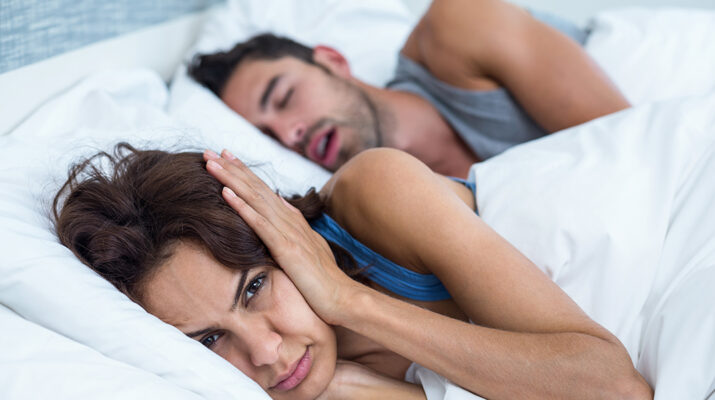By Deborah Jeanne Sergeant

Snoring can mean more than just a pesky nocturnal noise to the non-snorers in the house. It can indicate that the one “sawing logs” has sleep apnea, which can have serious health consequences.
“Snoring is ‘apnea light,’ a narrowing of the airways,” said Alice Hoagland, sleep specialist at Rochester Regional Health. “The tissues in your throat rattle around. There is some interesting literature saying that even individuals who snore in the absence of pathological sleep apnea can have cardiovascular concerns like hypertension and can have fractured sleep. They can have poorer subjective experience of their own sleep.”
Untreated sleep apnea can increase risk of high blood pressure; insulin resistance and eventual type 2 diabetes; heart disease and stroke; daytime fatigue; and mental health problems like mood disorders and cognitive impairment because of the lack of quality rest.
Continuous positive airway pressure (CPAP) may help. Most insurance companies will not cover CPAP if the patient has not received a sleep study. The CPAP equipment can cost $600. Some also dislike the thought of sleeping with a breathing mask and equipment near their bed. But patients have other options. Hoagland said that lifestyle changes such as weight loss can make a difference.
“When people gain weight, one of the first places to gain is the back of the tongue,” she said. “When the tongue gets fat, it collapses on the back of the airway and causes sleep apnea. Losing weight helps control sleep apnea and snoring.”
A shorter-term fix may be changing the sleeping position. Sleeping on the side helps prevent the jaw from unhinging and allowing the tongue to sag into the airways unlike sleeping on the back.
“We recommend people avoid alcohol before bed,” Hoagland said. “It’s a muscle relaxant and the last thing a snorer needs is more relaxed muscles in the back of the throat. That applies to all sedatives like muscle relaxants.”
Ensuring that nasal passages are clear and open can also help prevent mouth breathing that leads to snoring.
Dental appliances can help people with snoring and mild sleep apnea. Paul Sussman, dentist with Center for Cosmetic Dentistry in Rochester, said that it works by bringing the jaw forward.
“It allows air to flow through more freely and eliminates snoring,” he said.
To get a good fit, dentists take impressions of the teeth. The custom-made device fits completely inside like a dental mouth guard.
“A lot of people wear CPAPS and struggle with them,” he said. “It depends on the insurance company but if they can’t tolerate a CPAP, some will cover a dental appliance.”
Like with the CPAP equipment, the patient seeking a dental appliance must have a formal diagnosis of sleep apnea to have a chance at coverage for a dental appliance to prevent apnea. Healthcare providers and dentists can refer patients for a sleep study. Before undertaking a sleep study, patients should contact their health insurance provider to ensure coverage of the study and for any equipment or appliances that can help them with sleep apnea.

